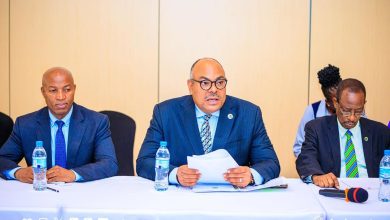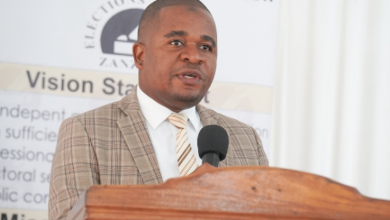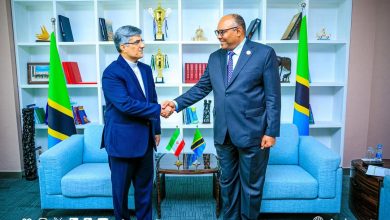‘Without plan, chaos is inevitable’

DAR ES SALAAM: IN a political landscape often defined by grand speeches and broad declarations, Gombo Samandito Gombo, the presidential candidate for the Civic United Front (CUF), is positioning himself as an architect of change.
At 55, his campaign for the nation’s highest office is anchored in a simple but powerful mantra, leadership rooted in planning, fairness and opportunity. It is a message that resonates deeply with a populace hungry for tan – gible progress.
Gombo’s vision isn’t just a political slogan; it’s a reflection of his life’s work. Born in 1970 in the Misungwi District of Mwanza Region, he dedicated his early career to a field that is all about structure and foresight, urban and rural planning. He holds both a bachelor’s and a master’s degree from the University of Dar es Salaam’s Ardhi Institute, a foundation he leveraged in public service as an urban planning officer in Ilala and Songea.
“My background in planning has taught me that everything sustainable begins with a clear structure, whether it’s a city or a country; without a plan, chaos is inevitable,” he said, insisting that this philosophy is the blueprint for his entire political agenda.
After a decade in government, Gombo transitioned into the private sector, founding successful businesses in real estate, urban planning and housing solutions. This move provided him with a new perspective, one that combined his public service knowledge with the efficiency and results-driven mindset of an entrepreneur.
He entered politics in 2015 and while his parliamentary bid was unsuccessful, the experience gave him an invaluable, firsthand understanding of the daily struggles of ordinary Tanzanians.
ALSO READ: Zanzibar VP underscores peace ahead of 2025 polls
Later, as the District Executive Director for Mringa, he gained practical experience managing local development projects and public services, further solidifying his connection to the people he hopes to lead.
Mr Gombo’s campaign promises are a detailed extension of his planningcentric philosophy, moving beyond vague statements to offer specific, if ambitious, policy prescriptions.
His agenda is a direct response to the most pressing challenges facing Tanzania today, from youth unemployment to a strained healthcare system At the heart of Gombo’s economic plan is a direct assault on the issue of youth unemployment.
He said that thousands of graduates remain jobless because public sector vacancies aren’t being filled, a challenge the current government has been struggling with.
Mr Gombo pledges to “absorb all qualified young professionals into the system,” claiming he knows where the gaps are and how to fill them. He also plans to strengthen national service programmes, not just for discipline and patriotism but to provide youth with practical, employable skills.
The current system, while functional, lacks the comprehensive skill development that Gombo envisions. “Joining the national service will not only prepare our youth for employment but also for nation-building,” he said.
In education, his proposals are equally bold. He promises to build a system that prepares students for the future, with a focus on technology.
At the heart of Gombo’s economic plan is a direct assault on the issue of youth unemployment. He said that thousands of graduates remain jobless because public sector vacancies aren’t being filled, a challenge the current government has been struggling with.
Mr Gombo pledges to “absorb all qualified young professionals into the system,” claiming he knows where the gaps are and how to fill them. He also plans to strengthen national service programmes, not just for discipline and patriotism but to provide youth with practical, employable skills.
The current system, while functional, lacks the comprehensive skill development that Gombo envisions. “Joining the national service will not only prepare our youth for employment but also for nation-building,” he said.
In education, his proposals are equally bold. He promises to build a system that prepares students for the future, with a focus on technology.
ALSO READ: CCK promises to lower living costs
CUF’s manifesto commits to a significant increase in the education budget, aiming for at least 25 per cent of the national budget, with half of that dedicated to pre-primary and primary schools. This is a substantial leap from the current government’s allocation, which has hovered around 18-19 per cent and a pledge that would require major fiscal reform and reallocation of funds.
“It’s a move that aims to address the persistent challenges of high pupil-toteacher ratios and outdated curricula, which have long been a bottleneck in the country’s education system,” he said.
Gombo’s vision extends to every sector, emphasising fairness and the creation of opportunity. On healthcare, he said that medical services should be a right, not a privilege and pledges to offer free medical services to all citizens.
“This is a significant shift from the current system, where the recently passed Universal Health Insurance (UHI) Act provides a framework for coverage but has faced implementation challenges and is not yet fully universal,” he said.
CUF’s manifesto backs this promise with a commitment to increase the health sector budget to at least 15 per cent of the national budget and establish universal health insurance by 2030, an ambitious but necessary goal to address the widespread shortages of health facilities and workers.
In a country where agriculture remains the largest employer, Gombo’s platform dedicates a substantial 10 per cent of the national budget to the sector.
“This funding would support critical areas like research, irrigation and rural roads, aiming to boost productivity and farmers’ incomes,” he said.
The party also plans to modernise fishing ports and implement a Livestock Sector Master Plan, targeting job creation and economic growth in rural and coastal communities. His infrastructure plan is a testament to his background in planning, he pledges to complete the stalled sections of the Standard Gauge Railway (SGR), upgrade existing lines and connect all 26 regions with tarmac roads by 2030.
“These projects, while already underway to some extent by the current administration, require significant capital investment and effective management,” he said, a task he believes his experience makes him uniquely suited for.
On taxation, Gombo proposes a streamlined singletax model integrated with the National Identification Authority (NIDA) system. He said this is an innovative approach aimed at enhancing transparency, reducing loopholes and formalising the informal economy, thereby widening the tax base and simplifying compliance for citizens. Perhaps the most radical proposal in his platform is the introduction of a Universal Basic Income (UBI).
This policy, which would provide unconditional cash payments to all citizens, is a direct response to poverty.
“This is about dignity. Every Tanzanian deserves a foundation to build upon,” he said.
While a UBI could be a powerful tool, its implementation in a developing economy like Tanzania presents immense challenges, including the massive cost and the risk of inflation or disincentivising work.
The plan to formalise the informal economy would be a crucial step in making this financially viable, but it would require a level of administrative efficiency and revenue collection that Tanzania has yet to achieve. Mr Gombo said that his campaign is not about empty promises but about planning, action and delivering what the people deserve.





